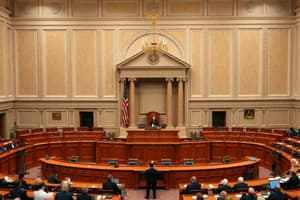Podcast
Questions and Answers
How does the structure of the Senate reflect principles of representation?
How does the structure of the Senate reflect principles of representation?
- Each state receives equal representation with two senators. (correct)
- Representation is determined by the geographical size of each state.
- The number of senators is adjusted annually based on census data.
- Representation is based on the population size of each state.
What is the significance of the Permanent Apportionment Act of 1929?
What is the significance of the Permanent Apportionment Act of 1929?
- It mandated that each state must have at least two representatives.
- It set the maximum number of representatives in the House at 435. (correct)
- It established the process of redistricting states into congressional districts.
- It outlined the criteria for determining the size and shape of congressional districts.
How does redistricting affect representation in the House of Representatives?
How does redistricting affect representation in the House of Representatives?
- It establishes the rules for how debates are conducted on the House floor.
- It ensures that each state has an equal number of representatives regardless of population.
- It determines the total number of seats each state is allocated.
- It divides states into districts, influencing the political landscape and representation. (correct)
What role does the Vice President play in the Senate?
What role does the Vice President play in the Senate?
How does the majority leader influence the legislative process in the Senate?
How does the majority leader influence the legislative process in the Senate?
What is the role of the Speaker of the House?
What is the role of the Speaker of the House?
Why are congressional committees essential to the functioning of Congress?
Why are congressional committees essential to the functioning of Congress?
How do party leadership dynamics affect committee assignments?
How do party leadership dynamics affect committee assignments?
What distinguishes the House Rules Committee from other types of committees?
What distinguishes the House Rules Committee from other types of committees?
What is the primary purpose of a conference committee?
What is the primary purpose of a conference committee?
What does congressional oversight entail?
What does congressional oversight entail?
What role does the House of Representatives play in the impeachment process?
What role does the House of Representatives play in the impeachment process?
What is the Senate's responsibility in the impeachment process?
What is the Senate's responsibility in the impeachment process?
If a bill passes both the House and Senate but with differing language, what is the next step in the legislative process?
If a bill passes both the House and Senate but with differing language, what is the next step in the legislative process?
Following the 2020 census, Texas gained additional seats in the House of Representatives bringing their total to 38. What process determined this new allocation of seats?
Following the 2020 census, Texas gained additional seats in the House of Representatives bringing their total to 38. What process determined this new allocation of seats?
Flashcards
What is a bicameral legislature?
What is a bicameral legislature?
A legislative body with two chambers or houses.
What is the Senate?
What is the Senate?
The upper house of the United States Congress, consisting of 100 members, with each state having equal representation.
What is 1/3?
What is 1/3?
The number of senators elected every 2 years.
What is equal representation?
What is equal representation?
Signup and view all the flashcards
What is the House of Representatives?
What is the House of Representatives?
Signup and view all the flashcards
What is proportional representation?
What is proportional representation?
Signup and view all the flashcards
What is Reapportionment?
What is Reapportionment?
Signup and view all the flashcards
What is redistricting?
What is redistricting?
Signup and view all the flashcards
Who is the Vice President?
Who is the Vice President?
Signup and view all the flashcards
Who is the Senate Majority Leader?
Who is the Senate Majority Leader?
Signup and view all the flashcards
Who is the Speaker of the House?
Who is the Speaker of the House?
Signup and view all the flashcards
What are Committees?
What are Committees?
Signup and view all the flashcards
What is a Standing Committee?
What is a Standing Committee?
Signup and view all the flashcards
What is the House Rules Committee?
What is the House Rules Committee?
Signup and view all the flashcards
What is Congressional oversight?
What is Congressional oversight?
Signup and view all the flashcards
Study Notes
The Bicameral Legislature - Requirements
- The Senate is referred to as the "Upper House" and the House is referred to as the "Lower House".
- The Senate has 100 members.
- The House has 435 members.
- The Senate has equal representation per state.
- The House has proportional representation.
- Senators serve 6 year terms.
- House members serve 4 year terms.
- 1/3 of Senators are elected every 2 years.
- All House members are elected every 2 years.
- The State is represented in the Senate.
- The District is represented in the House.
How Are Congressional Districts Created?
- The Permanent Apportionment Act of 1929 permanently set the maximum number of representatives at 435.
- Reapportionment is the process of reallocating all 435 seats in the House of Representatives based on population.
- Redistricting is the process of dividing states into districts.
- The states determine the boundaries of the districts; usually, the state legislature.
- Each district must have approximately the same number of people.
- Following the 2020 Census, Texas gained representatives, making the new total of US House Representatives 38.
- In Texas, 25 out of the 38 districts have a Republican representative.
119th Congress (Senate)
- There are 53 Democrats in the US Senate.
- There are 45 Republicans in the US Senate.
- There are 2 Independents in the US Senate.
- The Vice President votes in case of a tie and presides over the Senate.
- In the VP's absence, a President Pro Tempore will preside.
- At the beginning of each Congressional Session (every 2 years), party leaders are elected by a majority vote of all the senators of their party assembled in a conference or caucus.
- Ultimate power belongs to the Majority Leader, who acts as the party's spokesperson and makes decisions related to legislation and committee membership.
- John Thune is the current Senate Majority Leader.
119th Congress (House of Representatives)
- There are 215 Democrats in the House.
- There are 218 Republicans in the House.
- There are 2 vacancies.
- At the beginning of each Congressional Session (every 2 years), the House votes on the position of Speaker of the House.
- The Speaker of the House serves the role of presiding officer and administrative head of the House and leader of the majority party in the House.
- The Speaker assigns bills to committees and decides when a bill will be presented to the floor for a vote.
- Mike Johnson is the current Speaker of the House
Congressional Committees
- Congressional committees are small groups oriented around policy or procedural issues.
- Committees divide up the work of Congress.
- Committees exist in both the House and Senate.
- Committee membership and Chairs are determined by the majority party leadership.
- Party members who do not have a good relationship with their party leadership may not get the committee assignments they desire.
What Are Various Types of Committees?
- Standing Committees are permanent committees responsible for a particular policy area.
- The House Rules Committee determines how and when debate on a bill will take place.
- Select (special) Committees are committees appointed to deal with an issue or problem not suited to standing committees.
- Joint Committees are committees made up of members from the House and Senate.
- Conference Committees are formed to reconciled differences in the House and Senate versions of a bill.
Roles of Congress
- Congressional oversight refers to the efforts of Congress, through committees, to monitor agency rule-making, enforcement, and implementation of congressional policies.
- In 2024, House Committees are trying to investigate Hunter and Joe Biden for illegal business dealings.
- In 2021, Congressional Committees investigated the events of Jan. 6 attack on the Capitol.
- Mark Zuckerberg testified before committees regarding social media and privacy concerns in 2018.
- Impeachment is a formal charge by the House on the president (or other members of the executive branch) for “treason, bribery, or other high crimes, misdemeanors” which may result in removal from office.
- The House votes to impeach.
- The Senate votes to convict/acquit.
- Andrew Johnson (1868), Bill Clinton (1998), and Donald Trump (2019) were impeached.
- Nixon resigned before a full House vote on impeachment in 1974.
Studying That Suits You
Use AI to generate personalized quizzes and flashcards to suit your learning preferences.



